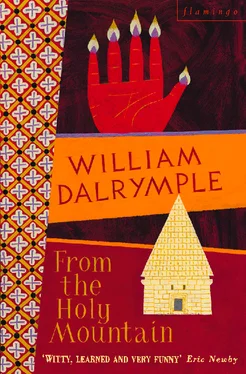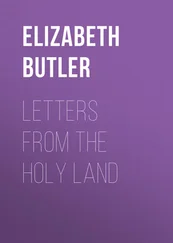A night ferry across the black Bosphorus to Haydarpasha, the Anatolian railhead of the old Berlin to Baghdad railway that T. E. Lawrence spent so long trying to blow up. Tomorrow to Ankara to pick up my press card.
On the train the conductor had no record of my reservation. But he asked me my nationality, and when I told him, I thought I saw a brief flicker of terror cross his face; certainly, I was immediately upgraded to first class. Only when I sat eating supper in the station restaurant did I discover the reason for this uncharacteristically flexible behaviour: there was a European Cup soccer match that evening between Manchester United and Galatasaray, and the television news was full of the English visitors’ traditional pre-match activities: trashing restaurants, picking fights, beating up innocent Turks and so on. For the first time I felt grateful for English football’s international reputation for hooliganism: it seemed that my compatriots from Manchester had unknowingly guaranteed me a first-class berth for the night.
NIGHT BUS BETWEEN ANKARA AND ANTIOCH, 6/7 AUGUST
4.15 a.m.: This is a horrible way to travel. It is nearly dawn, and the first glimmer of light has illuminated an expanse of flat plains covered by a wraith of thin mist. The rutted roads, the bracing crash of the long-defunct suspension, the snoring Anatolian peasants: these one expects and can bear. What is intolerable is the deliberate regime of sleep deprivation imposed on all passengers by this driver and his henchman, the moustachioed Neanderthal of a conductor.
Every other hour we pull in to some seedy kebab restaurant. The lights are put on, we are shaken awake and a Turkish chanteuse is put on the Tannoy so loud that we have no option but to vacate the bus. The driver and his friend disappear behind the scenes to pick up their commission from the restaurant owner, while we are all expected to make merry with plateloads of malignant kebabs or, even more horrible in the middle of the night, bags full of sickly-sweet Turkish delight.
Worse is to follow. On returning to our seats, the Neanderthal marches down the aisles, gaily shaking eau de cologne over the outstretched hands of the passengers. This can be quite refreshing at three o’clock on a hot afternoon; but it is irritating beyond belief at three o’clock in the dull chill of the early morning. And so on we trundle, rattling and shaking like a spin dryer, smelling like a tart’s boudoir, tempers rising steadily with each stop.
6 a.m.: We pull in to a particularly run-down kebabji which, with horrible inevitability, has suddenly materialised from nowhere amid the grey wastes of Anatolia. We stumble out of the bus and obediently line up for our breakfast, smelling like a collection of extras from some spectacular epic of an after-shave advertisement. Too weak to argue, too tired to care, I join the queue and load my plate with some slurry that must once have been an aubergine.
8 a.m.: Issus, site of Alexander’s great victory over the Persians. It may be one of the turning points in world history, but it’s a miserable-looking place now: a scrappy village with a petrol pump, a derelict electricity station and the statutory seedy restaurant over which hangs a terrible smell of grease and dead animal.
My neighbour in the bus, a garrulous traffic policeman from Istanbul, made the mistake of eating a kebab at the last stop and is now being noisily ill in the street; he has attracted a small circle of onlookers who appear to take the view that this is the most interesting thing to have happened in Issus for several months. Despite the early hour, it is already hot and muggy. We’re through the Cilician Gates and heading into the plains. On the far side of the road parties of bedraggled peasants are standing in lines, hoeing the dead ground beside the cotton and tobacco fields – or at least some are: most have put down their implements to watch my friend’s streetside evacuations.
The men here are a rough-looking bunch, scowling, ill-kempt and unshaven. But – looking around the motley crew filling the tables around me, and glimpsing my own reflection in the mirror – who are we to talk?
9 a.m.: Antioch: a gridiron of dirty alleyways surrounded on three sides by the crescent cliffs of Mount Silpius. As we leave the bus for the last time and stumble into the glare of the bus station the smirking Neanderthal offers us a last splash of eau de cologne . I shake my head, but get the horrible stuff poured all over me anyhow.
BUYUK ANTAKYA OTELI, ANTIOCH, 11 AUGUST
Cleansed, vowing never again to go on a night bus, nor ever again to touch eau de cologne , I went to bed for the rest of the morning, lulled to sleep by some of John Moschos’s more soporific miracle stories: tales of doughty Byzantine hermits fending off the advances of demonic temptresses and saucy ‘Ethiopic boys’.
With the exception of the mosaics in the museum and a few fragments of the much-rebuilt town walls, it seems that barely one stone remains from what was once the third greatest metropolis in the Byzantine Empire and briefly, under Julian the Apostate, its capital. Of the city’s famous buildings – Constantine’s Golden Octagon, the Council Chamber where Libanius declaimed, the great hippodrome that could seat eighty thousand people – nothing now remains. Like Alexandria, its traditional rival, Byzantine Antioch is now just a city of memory, forgotten but for the conjectures of scholars.
There is a reason for this. The city is built in the centre of an earthquake zone and has been levelled again and again, at least once every two hundred years. Today it is a sleepy, provincial place, architecturally undistinguished but for a few fine late-Ottoman villas decorated with carved wooden balustrades and with vines tumbling over the shuttered windows. Other than the occasional archaeologist, no one really bothers to come to Antioch any more: not the Turkish politicians, not the journalists, not the tourists, not even the PKK.
It is odd to think that all Europe, much of the Middle East and the entire length of the North African coast was once ruled from this little market town, today a forgotten backwater even by Turkish standards. Perhaps one day Los Angeles or San Francisco will be like this.
When John Moschos visited Antioch in the 590s, there were already many signs that the city was in serious decline. The School of Antioch, once one of the most sophisticated of all theological schools, was no longer in its prime. The days of John Chrysostom and Theodore of Mopsuestia were long past, even though it was probably at this time that Theodore of Tarsus came to the city to receive his training in the Antioch tradition of Biblical exegesis, a training he later brought with him to Anglo-Saxon England when he was appointed the seventh Archbishop of Canterbury. Antioch’s port, Seleucia ad Pieria, was beginning to silt up, and the great trade of the Mediterranean had begun passing the city by. The bazaars were empty but for local agricultural produce, and refugees were setting up shacks where once great caravans of merchants traded in silks and spices from Persia, India and the East.
Moreover, corruption had set in, and the city had the most dubious reputation. When the Emperor framed a troublesome Bishop of Antioch for consorting with a prostitute, no one for a minute doubted the bishop’s guilt. The Antioch theatre was famed for its great aquatic spectacles featuring (as one source puts it) ‘large numbers of naked girls from the lower classes’, and the city’s eighteen public baths were as disreputable as any in the Empire. St John Chrysostom, later the scourge of Constantinople, began his career as moral watchdog in Antioch, where he attacked the institution of ‘spiritual partnerships’ between monks and nuns and for good measure went on to accuse the city’s upper-class women of habitually exposing themselves before the eyes of their servants, ‘their softly nurtured flesh draped only in heavy jewellery’.
Читать дальше












